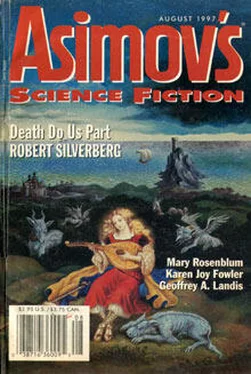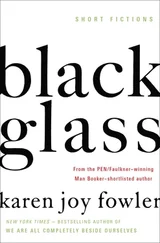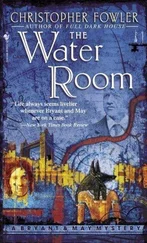Standing Room Only
by Karen Joy Fowler

On Good Friday 1865, Washington, DC, was crowded with tourists and revelers. Even Willard’s, which claimed to be the largest hotel in the country, with room for 1200 guests, had been booked to capacity. Its lobbies and sitting rooms were hot with bodies. Gaslight hissed from golden chandeliers, spilled over the doormen’s uniforms of black and maroon. Many of the revelers were women. In 1865, women were admired for their stoutness and went anywhere they could fit their hoop skirts. The women at Willard’s wore garishly colored dresses with enormous skirts and resembled great inverted tulips. The men were in swallowtail coats.
Outside it was almost spring. The forsythia bloomed, dusting the city with yellow. Weeds leapt up in the public parks; the roads melted to mud. Pigs roamed like dogs about the city, and dead cats by the dozens floated in the sewers and perfumed the rooms of the White House itself.
The Metropolitan Hotel contained an especially rowdy group of celebrants from Baltimore, who passed the night of April 13 toasting everything under the sun. They resurrected on the morning of the 14th, pale and spent, surrounded by broken glass and sporting bruises they couldn’t remember getting.
It was the last day of Lent. The war was officially over, except for Joseph Johnston’s Confederate army and some action out west. The citizens of Washington, DC, still began each morning reading the daily death list. If anything, this task had taken on an added urgency. To lose someone you loved now, with the rest of the city madly, if grimly, celebrating, would be unendurable.
The guests in Mary Surratt’s boarding house began the day with a breakfast of steak, eggs and ham, oysters, grits and whiskey. Mary’s seventeen-year old daughter, Anna, was in love with John Wilkes Booth. She had a picture of him hidden in the sitting room, behind a lithograph entitled “Morning, Noon, and Night.” She helped her mother clear the table and she noticed with a sharp and unreasonable disapproval that one of the two new boarders, one of the men who only last night had been given a room, was staring at her mother.
Mary Surratt was neither a pretty women, nor a clever one, nor was she young. Anna was too much of a romantic, too star- and stage-struck, to approve. It was one thing to lie awake at night in her attic bedroom, thinking of JW. It was another to imagine her mother playing any part in such feelings.
Anna’s brother John once told her that five years ago a woman named Henrietta Irving had tried to stab Booth with a knife. Failing, she’d thrust the blade into her own chest instead. He seemed to be under the impression that this story would bring Anna to her senses. It had, as anyone could have predicted, the opposite effect. Anna had also heard rumors that Booth kept a woman in a house of prostitution near the White House. And once she had seen a piece of paper on which Booth had been composing a poem. You could make out the final version:
Now in this hour that we part,
I will ask to be forgotten never
But, in thy pure and guileless heart,
Consider me thy friend dear Eva.
Anna would sit in the parlor while her mother dozed and pretend she was the first of these women, and if she tired of that, she would sometimes dare to pretend she was the second, but most often she liked to imagine herself the third.
Flirtations were common and serious, and the women in Washington worked hard at them. A war in the distance always provides a rich context of desperation, while at the same time granting women a bit of extra freedom. They might quite enjoy it, if the price they paid were anything but their sons.
The new men had hardly touched their food, cutting away the fatty parts of the meat and leaving them in a glistening greasy wasteful pile. They’d finished the whiskey, but made faces while they drank. Anna had resented the compliment of their eyes and, paradoxically, now resented the insult of their plates. Her mother set a good table.
In fact, Anna did not like them and hoped they would not be staying. She had often seen men outside the Surratt boarding house lately, men who busied themselves in unpersuasive activities when she passed them. She connected these new men to those, and she was perspicacious enough to blame their boarder Louis Wiechman for the lot of them, without ever knowing the extent to which she was right. She had lived for the past year in a Confederate household in the heart of Washington. Everyone around her had secrets. She had grown quite used to this.
Wiechman was a permanent guest at the Surratt boarding house. He was a fat, friendly man who worked in the office of the Commissary General of Prisons and shared John Surratt’s bedroom. Secrets were what Wiechman traded in. He provided John, who was a courier for the Confederacy, with substance for his covert messages south. But then Wiechman had also, on a whim, sometime in March, told the clerks in the office that a Secesh plot was being hatched against the president in the very house where he roomed.
It created more interest than he had anticipated. He was called into the office of Captain McDavitt and interviewed at length. As a result, the Surratt boarding house was under surveillance from March through April, although it is an odd fact that no records of the surveillance or the interview could be found later.
Anna would surely have enjoyed knowing this. She liked attention as much as most young girls. And this was the backdrop of a romance. Instead, all she could see was that something was up and that her pious, simple mother was part of it.
The new guest, the one who talked the most, spoke with a strange lisp and Anna didn’t like this either. She stepped smoothly between the men to pick up their plates. She used the excuse of a letter from her brother to go out directly after breakfast. “Mama,” she said. “I’ll just take John’s letter to poor Miss Ward.”
Just as her brother enjoyed discouraging her own romantic inclinations, she made it her business to discourage the affections of Miss Ward with regard to him. Calling on Miss Ward with the letter would look like a kindness, but it would make the point that Miss Ward had not gotten a letter herself.
Besides, Booth was in town. If Anna was outside, she might see him again.
The thirteenth had been beautiful, but the weather on the fourteenth was equal parts mud and wind. The wind blew bits of Anna’s hair loose and tangled them up with the fringe of her shawl. Around the Treasury Building she stopped to watch a carriage sunk in the mud all the way up to the axle. The horses, a matched pair of blacks, were rescued first. Then planks were laid across the top of the mud for the occupants. They debarked, a man and a woman, the woman unfashionably thin and laughing giddily as with every unsteady step her hoop swung and unbalanced her, first this way and then that. She clutched the man’s arm and screamed when a pig burrowed past her, then laughed again at even higher pitch. The man stumbled into the mire when she grabbed him, and this made her laugh, too. The man’s clothing was very fine, although now quite speckled with mud. A crowd gathered to watch the woman— the attention made her helpless with laughter.
The war had ended, Anna thought, and everyone had gone simultaneously mad. She was not the only one to think so. It was the subject of newspaper editorials, of barroom speeches. “The city is disorderly with men who are celebrating too hilariously,” the president’s day guard, William Crook, had written just yesterday. The sun came out, but only in a perfunctory, pale fashion.
Читать дальше













